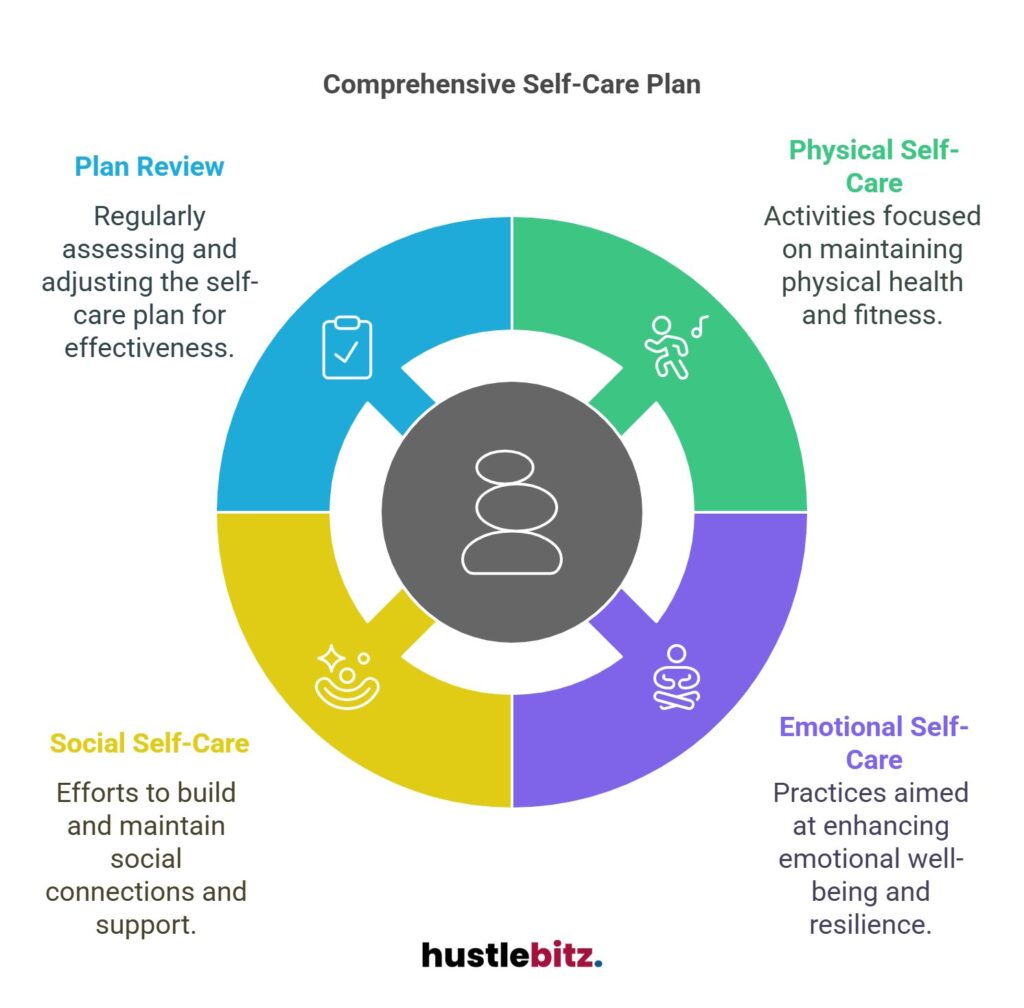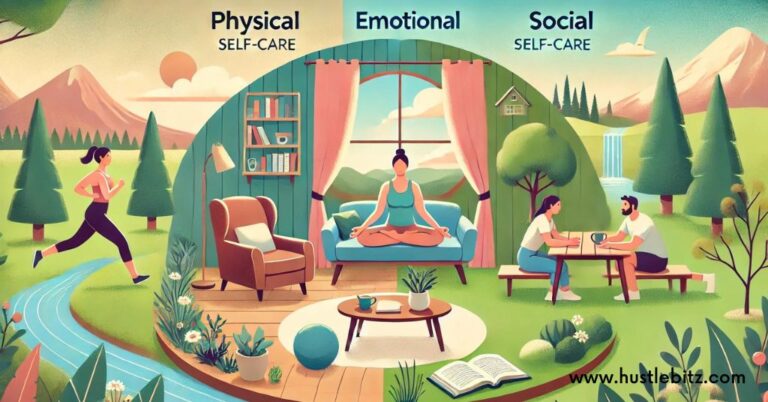A comprehensive self-care plan includes key elements that foster physical, emotional, and social well-being. It integrates regular physical activities, such as exercise and proper nutrition, to enhance overall health. Emotional self-care practices, including mindfulness, journaling, and creative activities, play a crucial role in building resilience and a positive mindset. Social self-care is vital for nurturing connections and creating a supportive network. Effective plans are tailored to individual needs, with specific and achievable goals. Regular reviews and adaptations ensure relevance and effectiveness. As you explore further, you will uncover even deeper insights into creating your personalized self-care approach.
Key Takeaways
- A comprehensive self-care plan includes physical, emotional, and social dimensions tailored to individual needs and preferences.
- Integrate self-care activities into daily routines and set specific, achievable goals for consistency.
- Engage in regular mindfulness practices, journaling, and creative activities to enhance emotional resilience.
- Foster social connections through intentional interactions and regular check-ins with friends and colleagues.
- Continuously review and adjust the self-care plan to ensure it remains relevant and effective over time.

Understanding Self-Care

Understanding self-care is essential for fostering overall well-being, as it encompasses a proactive approach to maintaining physical, emotional, and mental health. For those dedicated to serving others, a comprehensive self-care plan becomes indispensable. It not only supports personal resilience but also enhances the capacity to assist others effectively.
Effective self-care strategies are tailored to meet individual needs and can include a variety of self-care activities. These activities may range from mindfulness practices and journaling to engaging in creative pursuits or establishing boundaries that protect one’s energy. By prioritizing these strategies, individuals cultivate a healthier relationship with themselves, ultimately reflecting in their interactions and service to others.
The significance of understanding self-care extends beyond mere activities; it involves recognizing the importance of balance and self-compassion. Individuals must acknowledge that self-care is not selfish, but rather a necessary component of health and well-being. This understanding empowers individuals to invest in their own nourishment, which in turn allows them to offer more meaningful support to those around them.
Incorporating a self-care plan into daily life can lead to improved emotional regulation, reduced stress levels, and enhanced overall health. By committing to regular self-care activities, individuals can develop a sustainable routine that nurtures their well-being. In doing so, they are better equipped to serve their communities, fostering an environment where mutual support and care thrive.
Incorporating Physical Activity
Incorporating physical activity into a self-care plan is vital for enhancing both physical health and mental well-being. Engaging in regular exercise is a fundamental aspect of physical self-care, as it not only improves cardiovascular health and strengthens muscles but also promotes a sense of accomplishment and boosts mood.
For those dedicated to serving others, prioritizing physical wellness is crucial, as it equips individuals with the energy and resilience needed to effectively support those around them.
To create an effective self-care plan, it is essential to identify activities that help achieve personal fitness goals while also fitting into one’s lifestyle. These activities can range from structured workouts, such as yoga and strength training, to more enjoyable pursuits like dancing or hiking.
Incorporating a variety of exercises not only keeps the routine engaging but also ensures comprehensive benefits for overall health. Moreover, establishing a consistent schedule for physical activity enhances accountability and commitment.
Setting realistic goals, tracking progress, and celebrating achievements can further motivate individuals to remain active. Additionally, engaging in group activities or classes can foster social connections, thus enriching the wellness experience.
Ultimately, the integration of physical activity into a self-care plan is a cornerstone for achieving holistic well-being. By investing time and effort in physical self-care, individuals not only enhance their own health but also cultivate the strength and vitality necessary to effectively serve and uplift others in their community.
Mental Self-Care

Mental self-care is essential for maintaining emotional resilience and fostering a positive mindset, acting as a foundation for overall well-being. In a comprehensive self-care plan, prioritizing mental self-care enables individuals to serve others more effectively. By nurturing our mental health, we create a stable environment that enhances our ability to support those around us.
Implementing self-care strategies that work is crucial for cultivating mental well-being. These strategies may include mindfulness practices, such as meditation and deep breathing, which help in reducing stress and promoting clarity of thought. Additionally, engaging in creative activities or hobbies can provide an essential outlet for expression and relaxation, ultimately contributing to improved mental health.
Moreover, setting aside time for self-reflection allows individuals to assess their thoughts and feelings, fostering greater self-awareness. Journaling can be particularly beneficial, as it helps articulate emotions and track progress over time. It also serves as a tool for identifying patterns that may require attention or adjustment in one’s self-care plan.
Understanding the self-care benefits of prioritizing mental health is fundamental for anyone committed to serving others. By taking care of our mental well-being, we enhance our capacity for empathy, compassion, and resilience, which are indispensable qualities in any caregiving role. Therefore, integrating mental self-care into your routine is not just a personal necessity; it is a profound investment in the well-being of those you aim to support.
Emotional Well-Being Strategies

Fostering emotional well-being requires a proactive approach that includes various strategies aimed at enhancing self-awareness and resilience. Central to this endeavor is the establishment of a self-care routine that prioritizes emotional self-care. This involves dedicating time to reflect on one’s feelings, identifying stressors, and acknowledging mental health issues that may arise.
To effectively enhance your well-being, consider integrating mindfulness practices into your daily life. Techniques such as meditation, journaling, or deep-breathing exercises can serve as powerful coping strategies, allowing individuals to manage anxiety and emotional turmoil. Additionally, engaging in creative outlets, such as art or music, can facilitate emotional expression and provide relief from stress.
It is also vital to cultivate a supportive internal dialogue. Challenge negative thoughts and replace them with affirmations that reinforce self-worth and resilience. This mental shift can significantly impact one’s emotional landscape, creating a foundation for healthier interactions and relationships.
Moreover, establishing boundaries is crucial in maintaining emotional health. Learning to say no and prioritizing personal needs can prevent burnout and emotional exhaustion. Regularly assessing your self-care routine ensures that it remains aligned with your evolving emotional needs.
In summation, emotional well-being strategies are essential components of a comprehensive self-care plan. By implementing these practices, individuals can not only navigate their own emotional landscapes but also better serve and support those around them.
Social Self-Care

Nurturing social connections is a vital aspect of self-care that enhances overall well-being and resilience. For individuals in social work and related fields, fostering relationships is essential not only for personal growth but also for effectively serving communities to promote health. Engaging with others creates a support network that can help meet your needs during challenging times, thus reinforcing your capacity to support those around you.
Social self-care involves intentional activities that strengthen personal and professional relationships. These activities might include joining local organizations, participating in community events, or simply reaching out to colleagues and friends for regular check-ins. Establishing a routine that incorporates these engagements can lead to a more fulfilling life and a stronger sense of belonging.
Moreover, it is crucial to cultivate a diverse social circle that reflects various perspectives and experiences. This diversity enriches your understanding of the communities you serve and enhances your ability to empathize with their challenges. By actively participating in social networks, you not only enhance your own resilience but also contribute to a supportive environment for others.
Ultimately, prioritizing social self-care is about creating and maintaining relationships that foster mutual support. By acknowledging the importance of these connections, you can build a robust foundation for both personal fulfillment and professional effectiveness, ensuring that you are better equipped to serve your community.
Create a Comprehensive Self-Care Plan
A comprehensive self-care plan encompasses various dimensions of well-being, including physical, emotional, and social aspects, ensuring a holistic approach to personal health and professional effectiveness. To create your own self-care plan, begin by identifying the types of self-care that resonate with you, and consider how these can be integrated into your daily routine.
Here’s an illustrative table to guide your journey:
| Dimension | Activities to Consider | Frequency |
| Physical | Exercise, nutrition, sleep | Daily |
| Emotional | Journaling, meditation, therapy | Weekly |
| Social | Connecting with friends, volunteering | Monthly |
These activities are essential components of a personalized self-care plan. By exploring various ways to get started, you can prioritize actions that uplift your spirit and enhance your capacity to serve others.
Consider setting specific, achievable goals within each dimension. For instance, aim for a 30-minute walk three times a week, or schedule a monthly coffee date with a friend. This structured approach not only fosters your well-being but also empowers you to contribute more effectively to those around you. Remember, an effective self-care plan is not one-size-fits-all; it should reflect your unique needs and lifestyle. Consistently revisiting and adjusting your plan will ensure it serves you well in the long run, leading to a more fulfilling and impactful life.
Final Thoughts
Developing a comprehensive self-care plan is a powerful way to enhance your overall well-being. By addressing the physical, emotional, and social aspects of your life, you create a balanced approach that supports your health and happiness. Remember, self-care is a personal journey, and your plan should be tailored to your unique needs and circumstances. Regularly reviewing and adjusting your plan will help ensure it continues to serve you well. By committing to your self-care, you not only improve your own quality of life but also increase your ability to contribute positively to the lives of others.




